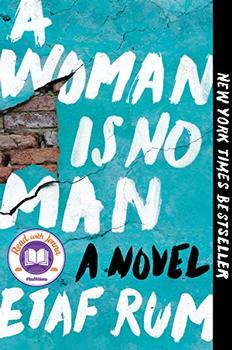Summary | Excerpt | Reading Guide | Reviews | Beyond the Book | Readalikes | Genres & Themes | Author Bio

A Novel
by Etaf RumIsra
BIRZEIT, PALESTINE
Spring 1990
For most of her seventeen years Isra Hadid cooked dinner with her mother daily, rolling grape leaves on warm afternoons, or stuffing spaghetti squash, or simmering pots of lentil soup when the air became crisp and the vineyards outside their home went empty. In the kitchen she and Mama would huddle against the stove as if sharing a secret, steam swirling around them, until the sunset cast a sliver of orange through the window. Looking out, the Hadids had a mountaintop view of the countryside—hillsides covered with red-tiled rooftops and olive trees, bright and thick and wild. Isra always cracked the window open because she loved the smell of figs and almonds in the morning, and at night, the rustling sounds of the cemeteries down the hill.
It was late, and the call for maghrib prayer would soon come, bringing an end to the cooking. Isra and Mama would withdraw to the bathroom, rolling up the sleeves of their house gowns, washing the dull red sauce off their fingertips. Isra had been praying since she was seven years old, kneeling beside Mama five times a day between sunrise and sunset. Lately she had begun to look forward to prayer, standing together with Mama, shoulders joined, feet slightly grazing, the only time Isra ever felt human touch. She heard the thick sound of the adhan calling them for prayer.
"Maghrib prayer will have to wait today," Mama said in Arabic, looking out the kitchen window. "Our guests are here."
There was a knock at the front door and Mama hurried to the sink, where she gave her hands a quick rinse and dried them with a clean rag. Leaving the kitchen, she wrapped a black thobe around her small frame and a matching hijab over her long, dark hair. Though Mama was only thirty-five years old, Isra thought she looked much older, the lines of labor dug deeply into her face.
She met Isra's eyes. "Don't forget to wash the garlic smell off your hands before greeting our guests."
Isra washed her hands, trying not to dirty the rose-colored kaftan that Mama had chosen for the occasion. "Do I look okay?"
"You look fine," Mama said, turning to leave. "Be sure to pin your hijab properly so your hair doesn't show. We don't want our guests to get the wrong impression."
Isra did as she was told. In the hall, she could hear her father, Yacob, recite his usual salaam as he led the guests to the sala. Soon he would hurry to the kitchen and ask for water, so she grabbed three glass cups from the cupboard and prepared them for him. Their guests would often complain about the steep hillside pathway to their home, especially on days like this when the air grew hot and it felt as though their house sat only a few inches from the sun. Isra lived on one of the steepest hills in Palestine, on a piece of land Yacob claimed to have purchased for the mountain view, which made him feel powerful, like a king. Isra would listen quietly to her father's remarks. She never dared tell Yacob how far from powerful they were. The truth was, Yacob's family had been evacuated from their seaside home in the Lydd when he was only ten years old, during Israel's invasion of Palestine. This was the real reason they lived on the outskirts of Birzeit, on a steep hill overlooking two graveyards—a Christian cemetery on the left and a Muslim one on the right. It was a piece of land no one else wanted, and all they could afford.
Still, Isra loved the hilltop view of Birzeit. Past the graveyards, she could see her all-girls school, a four-story cement building laced with grapevines, and across from it, separated by a field of almond trees, the blue-domed mosque where Yacob and her three brothers prayed while she and Mama prayed at home. Looking out the kitchen window, Isra always felt a mixture of longing and fear. What lay beyond the edges of her village? Yet as much as she wanted to go out there and venture into the world, there was also a comfort and safety in the known. And Mama's voice in her ear, reminding her: A woman belongs at home. Even if Isra left, she wouldn't know where to go.
Excerpted from A Woman Is No Man by Etaf Rum. Copyright © 2019 by Etaf Rum. Excerpted by permission of Harper. All rights reserved. No part of this excerpt may be reproduced or reprinted without permission in writing from the publisher.
Outside of a dog, a book is man's best friend. Inside of a dog it's too dark to read.
Click Here to find out who said this, as well as discovering other famous literary quotes!
Your guide toexceptional books
BookBrowse seeks out and recommends the best in contemporary fiction and nonfiction—books that not only engage and entertain but also deepen our understanding of ourselves and the world around us.